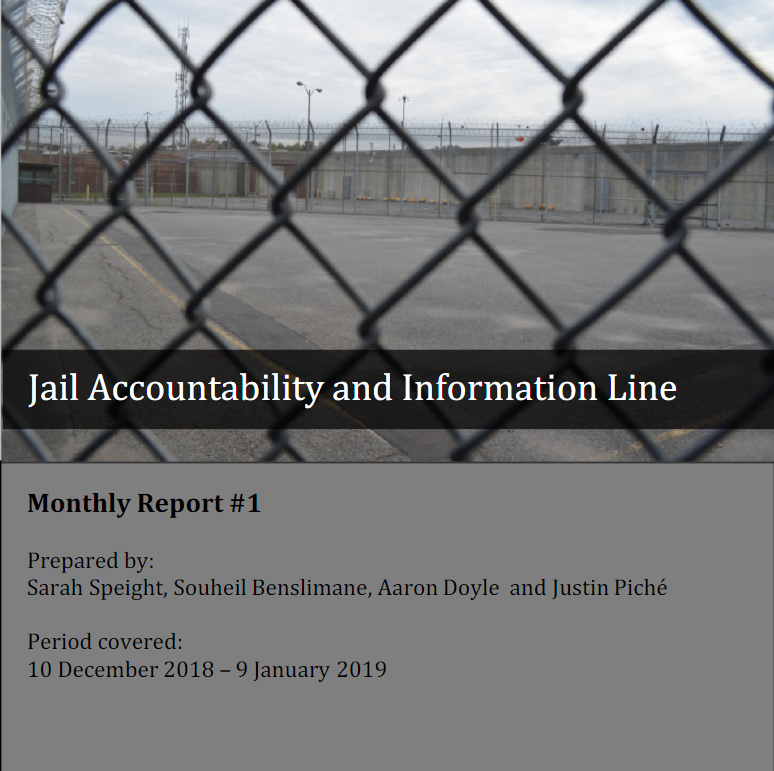Efforts to diminish the use and pains of imprisonment at OCDC while working towards abolition continue as the JAIL hotline marks its third anniversary
14 December 2021 (Algonquin Anishinaabe Territory / Ottawa) – Last Friday marked the third anniversary of the launch of the Jail Accountability & Information Line (JAIL), a hotline run by members of the Criminalization and Punishment Education Project (CPEP) that takes calls from people imprisoned at the Ottawa-Carleton Detention Centre (OCDC) and their loved ones to reduce the use and harms of imprisonment at the jail while working towards abolition. The initiative began following several preventable deaths and atrocities at the Innes Road jail.
Souheil Benslimane, CPEP member and Coordinator for the initiative, reflects on what’s been accomplished over the past three years and the work that remains to be done: “The JAIL hotline has taken thousands of calls and worked with imprisoned people to document conditions of confinement, address urgent needs such as access to medical care in the face of state neglect and abandonment, organized campaigns to address injustices including hardships stemming from the jail phone system and other privatized services that line the pockets of prison-industrial-complex profiteers, and arranged supports like Prisoner Emergency Support Fund stipends with the Toronto Prisoners’ Rights Project, Starter Packs for Newly Released Neighbours with Hit The Streets, and numerous other mutual aid campaigns to meet some of the basic needs of criminalized people behind and beyond bars. We can’t stop here. Through prisoner solidarity work, mutual aid, and collective struggle, we must build communities where we’re all safe. This requires access to the basic necessities of life, justice that meets human needs arising from harm and transforms the conditions that give rise to it, decolonization, liberation, and overthrowing the current systems that are causing the extinction life and the destruction of the land”.
Justin Piché, a CPEP member and criminology professor at the University of Ottawa, adds: “Initiatives like the JAIL hotline shouldn’t be necessary, yet because we as a society rely on human caging – which time and time again has proven to be demonstrably ineffective, costly, unjust and violent – the need for this work remains. What began at the initiative of Souheil Benslimane and Sarah Speight continues today. That’s an accomplishment, one that certainly would’ve not been possible without the involvement of others including current and former prisoners, law students, practicing lawyers, and professors who have worked at and volunteered their time with the hotline. The financial support of donors, a one-time grant from the Law Foundation of Ontario and on-going funding from the University of Ottawa’s Faculty of Social Sciences has also allowed this critical work to continue. It remains my hope that one day these efforts will no longer be needed because we will have built communities, not cages and achieved abolition in our lifetime”.
Commenting on the JAIL hotline’s anniversary, along with the resurgence in crowding at OCDC and the start of a new campaign to depopulate the jail, CPEP member and Carleton sociology professor Aaron Doyle states: “Despite the amazing work of many dedicated JAIL hotline staff and volunteers that worked with OCDC prisoners to diminish suffering at the jail and for decarceration, most of the same long-running problems persist such as grossly inadequate food and health care. We’re been very alarmed to hear through the hotline of recent increases in crowding leading to triple-bunking in some parts of the jail, especially given the risks of COVID transmission in such close quarters. It’s highly dangerous that horrendous crowding has returned to Ottawa’s jail during the pandemic after the courts and provincial government were previously able to reduce prison populations by 30 per cent in the early stages of the pandemic with few negative consequences simply by increasing the use of bail and reducing the use of custody for weekend sentences. It’s critical that Ontario’s Attorney General and Solicitor General act on the demands outlined in our email zap”.
For the remainder of the month, the JAIL hotline will take calls on weekdays from 1-4pm. Starting in the new year, the initiative will have expanded hours from 8:30am to 8:30pm. Legal information hours offered by law students from the University of Ottawa Prison Law Clinic will also resume in 2022 on Tuesdays and Thursdays from 10:00am to 11:30am. Individuals interested in getting involved in call intake and resolution or mutual aid work are encouraged to contact the JAIL hotline Coordinator (see below). Those interested in providing financial support for the initiative can make a donation through the uOttawa CPEP Fund.
English and French Media Interview Contact:
Souheil Benslimane
Coordinator, Jail Accountability & Information Line
Member, Criminalization and Punishment Education Project
jailhotline@gmail.com | 819-592-6469
Twitter: @jail_line and @CPEPgroup
Instagram: @CPEPgroup
Facebook: @CPEPgroup


